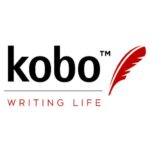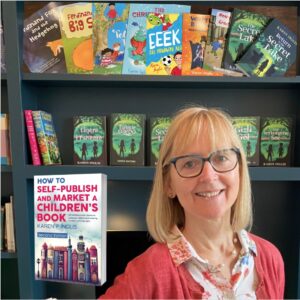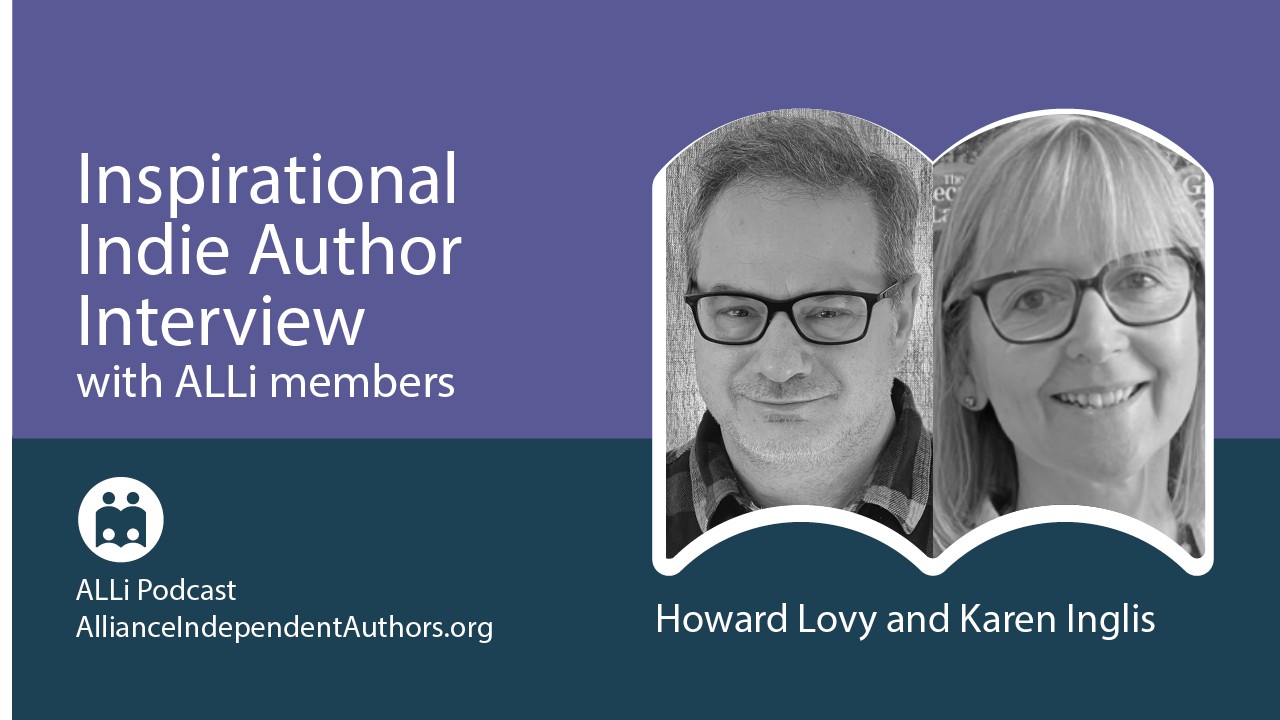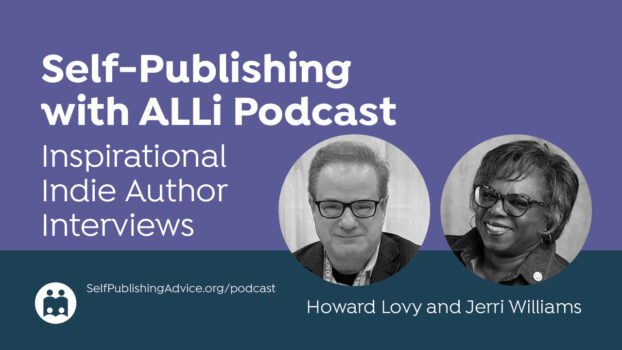My ALLi author guest this episode is Karen Inglis, a self-published children's author with over a half-million sales. She also wrote a book for other indie authors on how to write and market books for children. Among other things, she says it's important to think locally and write from the heart.
 ALLi's Inspirational Indie Author Podcast stream is sponsored by Kobo Writing Life, a global, independent ebook and audiobook publishing platform that empowers authors with a quick and easy publishing process and unique promotional opportunities. To reach a wide readership, create your account today! Thank you, Kobo, for your support of this podcast.
ALLi's Inspirational Indie Author Podcast stream is sponsored by Kobo Writing Life, a global, independent ebook and audiobook publishing platform that empowers authors with a quick and easy publishing process and unique promotional opportunities. To reach a wide readership, create your account today! Thank you, Kobo, for your support of this podcast.
Find more author advice, tips, and tools at our Self-Publishing Author Advice Center, with a huge archive of 2,000+ blog posts, and a handy search box to find key info on the topic you need.
We invite you to join our organization and become a self-publishing ally, if you haven’t already. You can do that at allianceindependentauthors.org.
Inspirational Indie Author Interview: Karen Inglis
On the Inspirational Indie Authors #podcast, @howard_lovy features @kareninglis, a children's author who also wrote book on marketing books for kids. The secret? Think locally. Share on XDon't Miss an #AskALLi Broadcast
Subscribe to our Ask ALLi podcast on iTunes, Stitcher, Player.FM, Overcast, Pocket Casts, Spotify or via our RSS feed:
Inspirational Indie Author Interview: Karen Inglis. About the Author
 Karen Inglis is an international bestselling children’s author of picture books, illustrated chapter books and middle grade novels. Her time travel adventure The Secret Lake, has sold over half a million print copies in English and is in translation in eleven languages. Her other titles have all sold in their thousands. Return to the Secret Lake, Karen’s long-awaited sequel to her bestseller, was recently shortlisted in the children’s categories for both the Wishing Shelf Book Awards and the UK Selfies Awards. Karen has received traditional publishing offers over the years but has preferred to retain creative control over her work. Her nonfiction title: How to Self-Publish and Market a Children’s Book, is now in its second edition Karen is Children’s Advisor at the Alliance of Independent Authors. You can find her on the web, Facebook, Twitter, and Instagram.
Karen Inglis is an international bestselling children’s author of picture books, illustrated chapter books and middle grade novels. Her time travel adventure The Secret Lake, has sold over half a million print copies in English and is in translation in eleven languages. Her other titles have all sold in their thousands. Return to the Secret Lake, Karen’s long-awaited sequel to her bestseller, was recently shortlisted in the children’s categories for both the Wishing Shelf Book Awards and the UK Selfies Awards. Karen has received traditional publishing offers over the years but has preferred to retain creative control over her work. Her nonfiction title: How to Self-Publish and Market a Children’s Book, is now in its second edition Karen is Children’s Advisor at the Alliance of Independent Authors. You can find her on the web, Facebook, Twitter, and Instagram.
About the Host
Howard Lovy has been a journalist for more than 35 years, and now amplifies the voices of independent author-publishers and works with authors as a developmental editor. Find Howard at howardlovy.com, LinkedIn and Twitter.
If you’re a published indie author who would like to be interviewed by Howard for the Inspirational Indie Authors podcast, you need to be a member of the Alliance of Independent Authors.
Then contact Howard, including your membership number, explaining why you’re an inspirational indie author and what inspires you.
If you haven’t already, we invite you to join our organization.
Read the Transcripts — Inspirational Indie Author Interview: Karen Inglis
Howard Lovy: My guest this episode is Karen Inglis, a self-published children's author with over half a million sales.
She also wrote a book for other indie authors on how to write and market books for children. Among other things, she says it's important to think locally and right from the heart. I'll let Karen Inglis tell her story.
Karen Inglis: Well, hello, my name's Karen Inglis. I'm here in London, UK on a rather grey and windy day, and I'm delighted to be here.
Just to say a little bit about me, some of you may have heard of me, I'm the Children's Advisor at the Alliance of Independent Authors. I write picture books, chapter books, and middle grade novels for children, and I have a bestseller called The Secret Lake, which has now sold over half a million print copies and is in translation in 11 languages, and in terms of what I'm currently doing at the moment, I'm doing research for book three of that series. So, that's a little bit about me.
Howard Lovy: When Karen was growing up, books were not a big part of her life. Instead, she chose to have adventures, something that would help her later as a children's author.
Karen Inglis: Well, that's interesting, I actually grew up in Hertfordshire, which is halfway between London and Cambridge, and I grew up in an area close to the countryside with Woodland all around me, and it was in the days when, of course, there were no mobile phones and so we used to go off into the woods having lots of adventures with our friends from a very young age, and our parents had no idea where we were.
In terms of books and reading, in fact, and I do say this when I go to school visits, I wasn't a huge reader as a very young child, although my mother took us to the library and she read to us a lot, and I think that influenced my imagination a lot, but I was actually into ponies and horse riding, and so I would spend all my spare time riding horses, if I wasn't out playing with my friends in the countryside.
Howard Lovy: Karen studied French and sociology in college, and worked as an educator after graduation.
Karen Inglis: So, I taught English as a foreign language for a couple of years, and actually ended up designing syllabuses to teach English as a foreign language to students who were enrolling.
This was in London; it was a foreign language school where we had multinational classes and they were enrolling every Monday. So, that was a big challenge for the school to be able to provide a weekly rolling syllabus, which if you happen to come to the school only for a week, you still got something out of it, but if you happen to be there for six weeks, you still got something out of it.
So, I became director of studies working with one other woman, and we created a whole syllabus based around teaching English as a foreign language. I obviously did a qualification in that after I went to university.
So again, this is sort of coming back to writing, being in my DNA, and I very much enjoyed that. I have quite a logical mind, and it worked so well that the director of the school bought the copyright of that from us.
In fact, at one point I did go for interviews with Macmillan Publishing, and they offered me a job actually as an editor in their English language training books division, but when I looked at the salary and the cost of the train fare to get out to Basingstoke, I sort of said, thanks, but no thanks.
Howard Lovy: Karen eventually worked abroad, first in the United States and then in Norway, where she did research oriented jobs. Then she moved back to the UK after five years and took corporate writing jobs.
It was after she had children though, that she thought more about her creative side.
Karen Inglis: It was during that time that I had the children, which was when I was then reading stories to them that I suddenly thought, oh, I think I could write a story, you know, I'd like to write a story, and that's where that came in at that point.
So, it was quite a long way down the line, when I go into schools, I do say to children that I didn't actually, I wasn't, not every author is one who grew up writing stories and thinking they wanted to be an author. So, don't think that just because you're not doing that now, you might not want to do it later, if you see what I mean.
Howard Lovy: Karen grew weary of some of the boring children's books she was reading to her kids. Then an experience triggered an idea and she set out to write her own.
Karen Inglis: Then it was just triggered by my seeing the most beautiful fox. What triggered it initially, I'd walked out of the gym, it was a November evening, the mist was rolling in under a lamp post, and this gorgeous urban fox went trotting past me, and unlike a lot of these urban foxes that look very mange and rather downtrodden, this one was so regal and beautiful, and he kind of looked me in the eye and then just carried on trotting, and I couldn't get him out of my mind, and I got this sort of tingly feeling, as I tell children.
He wouldn't go away, and that I started to think, oh, who is he? Where's he going? He looks such a lovely, kind fox. So, I started the rhyming stories of Ferdinand Fox came to me. So, I started off writing these rhyming stories, not really knowing what I was going to do with them, and then as I was writing them, more people kept telling me about other foxes they'd seen, you know, on their sun lounger, not wanting to get off the sun lounger.
So, I penned, I actually have six rhyming stories, two of which I've published. So, that's where I started, and then in terms of The Secret Lake, during that time when the boys were younger, some friends of ours moved to Notting Hill here in London. They were living in the general area there, but they moved from a muse house into a lower ground floor and ground floor apartment that backs onto the communal gardens of Notting Hill.
We went up to visit them, and at the time we had quite a small garden here. We had two young boys and their two children, and we went in to visit them and we went out through their patio garden into this enormous communal garden, and there were all these children running around, and it really reminded me of my childhood, the freedom I had to go out and what have you.
And I thought, gosh, wouldn't it be wonderful? I mean, A, how wonderful they've got this freedom, they're in London, yet they're safe. They can all have these sorts of woodlands to play in, but they can't get lost anywhere because all the houses surround the garden, if you see what I mean, they back onto them.
But also, as I looked around at those tall Victorian houses surrounding the parkland, I just thought, wouldn't it be wonderful if these children can meet the children who lived and played here a hundred years ago? And that was a sort of, first spark of the moment for the idea for The Secret Lake.
So, that was part of the inspiration, and then the other part of it was, we used to take our boys to play up in a special woodland here, close to where I live. Richmond Park is close to where I live, now that's 400 acres with deer in it and everything. But within that, there is an enclosed organic woodland that contains three ponds, one of which is called Still Pond, and it has the most incredible azaleas every May that reflect through the pond, and it's very, very magical. We used to take our boys up there, and again, with them running round in the woods, it sort of reminded me of my childhood, and those two things came together as this sort of springboard for The Secret Lake, because The Secret Lake is based on the pond.
Howard Lovy: Karen's story stayed in a box for 10 years, then she picked it up again and decided that self-publishing was for her.
Karen Inglis: I was about to send it out. I was going through what we call the writers and artists yearbook here, and then I was looking online and suddenly I saw all this information about self-publishing, which was happening mostly in America. Certainly, there were no children's authors self-publishing at the time, and I just thought, you know what, I don't think I'm going to send it out, I think I'm going to try this thing called self-publishing.
So, that's how that came about. Then to find an illustrator in answer to that side of things, I basically went online, and at the time there was a website called Elance, which I think is now called Upwork, and that's how I found the illustrator for the cover.
I sent him pictures from, he's in Bosnia, we've never met, and I sent him pictures of Still Pond, and sort of stickman sketches of how I imagined the children would be standing at the bottom of the tree with the boat coming towards them, and then he was able to create the front cover from that.
Howard Lovy: Next came the marketing side of the process, and the way Karen did that successfully was to think locally.
Karen Inglis: There was no way to advertise or anything like that. So, the way I my built my sales up, and I say this even now to this day, is I started to establish my brand locally.
So, I contacted local bookshops, our local village bookshop, effectively. I live in a place called Barnes here in London, but also our local branches of Waterstones, which is the major High Street bookshop here, and talked to them about the local connection of the story, and in fact went into the Notting Hill branch who just looked at it and said, gosh, this doesn't look self-published, yes, we'll take some.
I did local signings with Waterstones in the area, and this wasn't a case of people queuing up outside the door, because of course nobody knew me, but because you had a table there all day, you would just chat to the parents coming into the children's department, explain about the story, the connection, and sell them that way.
Then the other thing I did was I contacted local schools, and again, by that stage, I'd created a simple website using WordPress so I had something I could refer them to, and I got into local schools. So, it was very much hand selling for the first, well, right up until about 2017, it was mostly hand selling at school events and things like that, because there was no way to advertise.
Even though a few of the books were selling online, it wasn't huge because people wouldn't know me, unless they met me locally, they wouldn't know to look for a book called The Secret Lake. The game changer was, as it was, I'm sure, for many indie authors, was when they opened up advertising on Amazon, and by that stage I'd sold about 7,000 copies, which is no mean feat. I know it was over quite a long period of time and I had gone back to my consultancy work. So, I was doing it sort of piecemeal really, along with writing other books, but it was almost hand selling, but by the time 2017, I think it was, came along, started doing the advertising, and that was when the sales started to take off.
Howard Lovy: And as her sales started to take off, Karen began documenting what works in self-publishing. That eventually became a book called, How to Self-Publish and Market a Children's Book.
Karen Inglis: So, How to Self-Publish and Market a Children's Book is really aimed at people starting out in self-publishing and wanting to know what the key options are for self-publishing, and it covers both print-on-demand, obviously KDP and Ingram, but other options. But also, short runs, what your options are, who is it right for.
It touches on Kickstarter, there's a big community of children's authors over in the US in particular who've used Kickstarter for picture books, and in quite high numbers, and they have garages full of books and I take my hat off to them. You know, I make people aware of those, but I'm also very careful to talk about, just be sure you are doing what's right for you because actually, selling children's books is a challenge.
It really is because you're not selling directly to your audience, so there's a lot about that in there.
It also includes, by the way, before you self-publish, make sure you've got the right story and you know which age group you're writing for, because I think that's one of the biggest mistakes first time children's authors make. They think, I've got this story, but actually it's not targeted at the right age group in terms of the characters, the age of the characters, and/or the language or the length. Children don't want to be reading about loads of adults in their books, and that's a mistake I've seen budding children's authors make who haven't really studied the craft and haven't read around to see what works and what doesn't.
So, it covers all of that, and it talks about how to avoid scams, that sort of thing. Then it goes onto the whole of the marketing side, and particularly in the second edition, not just the marketing side, but more advanced side of things. So, I've sold rights to 11 countries, or 12 probably, as of yesterday.
So, I do talk on the more advanced level about foreign rights, that sort of thing, and translation. So, it is quite comprehensive, and can be used whether you are starting out or whether you are father down the line.
Howard Lovy: Based on her experience, Karen has some advice for other self-published children's authors.
Karen Inglis: Probably three main things. One is to obviously know who your target market is before you start writing, and go and do a lot of research reading books. Work out what length they need to be, what the themes are, what the language should be like, and so on. Be very clear about that, and test with people ideally who don't know you, children who don't know you, just to get a feel of if the story's working before you spend money on editors and things like that. Then you can get it as good as it can be, and then maybe pay for your editor.
The other thing is to start local in terms of once you've got your book, start local, and I will say that even now, start local, build your brand locally in the way that I described I did earlier. Just take opportunity of that and also go back to the school you went to, maybe there's an interest there. You could perhaps try and get in the local papers where you live or where you grew up.
Write from the heart as well is what I would say. I mean, I can't write to market. I'm not saying you shouldn't write to market, but I think, a lot of people say to me, why has The Secret Lake sold so many, and I think some other author, he said, I think it's the story. Yes, I do advertise, and I've done all that sort of thing, but it's because the story is selling itself. I think if you really write the story that is really in your heart, you've got more chance of it doing well.
And obviously using the usual professionals, don't cut corners. Just be sure that you do get advice and editing before you hit that publish button.





